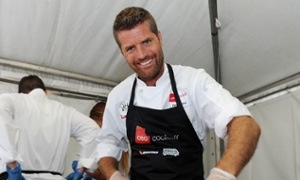
Australian celebrity chef Pete Evans planned to publish a “paleo diet” cookbook for children, Bubba Yum Yum: The Paleo Way, that encouraged parents to replace baby formula with a lunatic concoction of bone broth and liver. After healthcare professionals noted the recipe contained 10 times the safe amount of vitamin A for babies, putting kids at risk of death, the book was last week put on hold.
Then, on Saturday, Evans appeared at Melbourne Town Hall to sell the paleo diet. He reportedly told the crowd that he’s “not going to be silenced” and encouraged them to try his broth anyway. Pan Macmillan on Monday reportedly dropped the book, but Evans will go ahead and self-publish it digitally.
Is he blissfully unaware of the nutritional needs of children, or does he put the strictures of paleo living above all else? Either way, it should be clear that paleo is not just the Atkins diet in Flintstones drag, or a fad: it’s an ideology, with its own leading lights, intellectual heritage and political hinterland. Paleo advocates don’t just want us to cut down on processed carbs and grains, they’re dedicated to a selective denial of modernity, which in some cases is accompanied by anti-feminist attitudes.
The assumptions underpinning paleo have a superficial plausibility. While technology and culture have changed, it’s argued, our bodies have pretty well stayed the same. We evolved to be hunter-gatherers, and contemporary life, with its carbs and computers, is a mismatch with our biological make-up.
We shouldn’t therefore just give up on modern processed foods, but everything we began eating after we became sedentary farmers. We should stop eating not just Cheetos, but corn; not just Pepsi, but sugar. We should restrict ourselves to the meats, berries and nuts that our ancestors ate when they were living off the land.
The criticism of modern life meshes with the undeniable fact that Western affluence has produced many unintended consequences for public health – many modern processed foods are nutritionally valueless, and a lot of us don’t do as much exercise as we ought. It may also connect with the undeniable alienation many of us feel in a world where technology, fast food and urban living can sometimes seem like a self-imposed prison.
It’s shame, then, that the entire enterprise is intellectually bankrupt. The presumptions about what people in the old stone age ate are anthropologically naive: we can’t make universal claims about that with any degree of certainty, and inconveniently, evidence keeps emerging that people then did help themselves to high-carb foods when they were available. That’s because they were versatile, opportunistic and adaptable, like us.
After we learned how to farm, humans developed the ability to digest gluten and dairy products in a very short space of evolutionary time. (Even companion carnivore species, such as the dog, developed the ability to cope with a higher load of carbohydrates). The paleo diet is premised on a false image of stasis and harmony projected from an entirely arbitrary point in the long history of human evolution.
The human diet, as evolutionary biologist Marlene Zuk points out in her book Paleofantasies, is constantly changing. If we’re going to nominate a period to emulate, why not eat like a medieval peasant, or an ancestral tree shrew?
The answer to that has little to do with food. The paleolithic is a favoured era because of the way it answers to a desire to justify or reimpose certain social hierarchies, especially those concerning gender. If you read the books or Twitter feeds of paleo thought leaders like John Durant, you’ll find him flirting with “neoreactionary” ideas, talking like a Men’s Rights Activist, backing up Gamergate and generally coming over like a paid-up member of the redpill right.
— John Durant (@johndurant) April 28, 2013
When a small number of feminists whine and complain about trivial things (dongle jokes, oatmeal), it makes all women look weak.
Feminism is a particular bête noire. Durant spends pages of his cash-in book, The Paleo Manifesto, railing against the feminist Carol Adams, who connected feminism with vegetarianism. At one point he writes that “Adams’s meat-hating, man-hating mantra – ‘Eat Rice Have Faith in Women’ – is intended to undermine the male culture of meat-eating, thus undermining male power, thus reducing rape”. For Durant, the most prominent advocate for paleo, stone age eating seems closely bound up with regressive gender politics.
Like his mentor, Steven Pinker, Durant constructs an image of the “natural” that is entirely ideological. The real appeal of hunter-gatherer life is what he imagines to be its strict partition of gender roles, where “Men were hunters, women were gatherers” and where “women rewarded great hunters” with sex. Paleo eating is here connected with an image of society which reproduces itself largely through masculine competition.
In this connection, Pete Evans’s offal soup baby formula replacement seems doubly creepy: in effect, it expresses a belief that the bones and guts obtained by the hunter can not only supplant the products of modern medicine, but can effectively substitute for mother’s milk. On this view, the mighty, masculine hunter really can provide everything – except, it seems, a diet that’s safe for children to eat.
